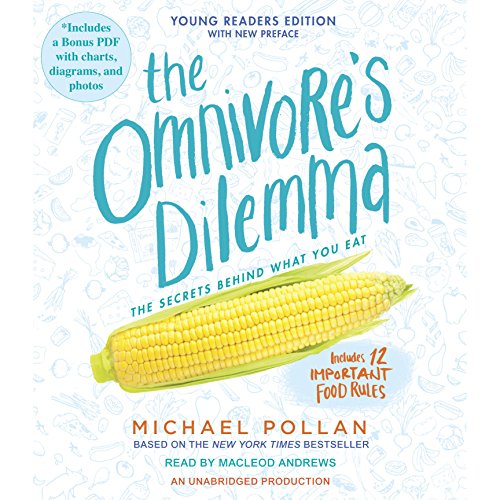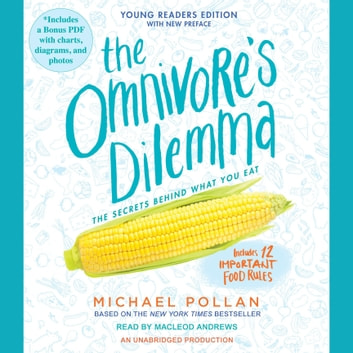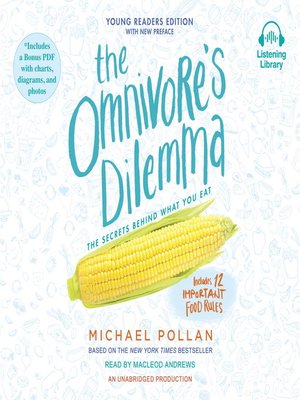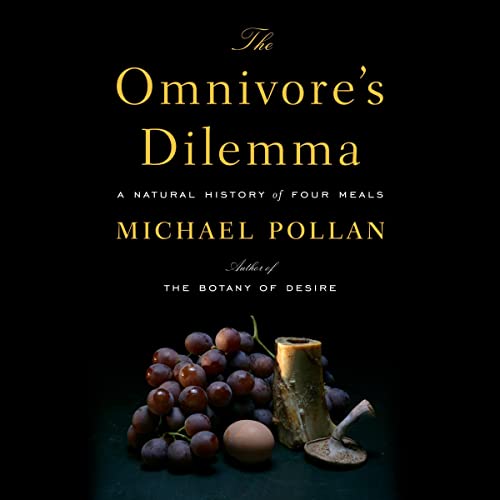Michael Pollan’s “The Omnivore’s Dilemma” audiobook explores the complexities of food choices. It examines the origins and impacts of our meals.
Michael Pollan delves into the intricate food landscape in “The Omnivore’s Dilemma. ” He investigates how our food gets to our plates, exploring industrial farming, organic food, and foraging. Pollan’s engaging narrative provides insights into food production’s ethical, environmental, and health aspects.
He highlights the challenges modern consumers face, making informed decisions about their diets. This audiobook encourages listeners to think critically about their food choices, fostering a deeper connection with what they eat. Perfect for anyone interested in nutrition, sustainability, or ethical eating, Pollan’s work offers valuable knowledge and thought-provoking perspectives.
Introduction To ‘the Omnivore’s Dilemma’
Michael Pollan’s audiobook, ‘The Omnivore’s Dilemma’, explores the complexities of food choices. The book delves into the origins of the food we consume. It addresses the ethical, environmental, and health implications.
Pollan’s narrative is engaging and thought-provoking. He takes listeners on a journey through different food chains. These include industrial, organic, and foraged foods. His insights challenge our everyday food decisions.
Michael Pollan’s Motivation For Writing
Pollan’s motivation stemmed from a deep curiosity. He wanted to understand the origins of our food. His goal was to uncover the hidden costs of our dietary choices. Pollan sought to reveal the impact of food production on our health and environment.
He was also driven by a desire to reconnect with nature. Pollan aimed to educate people about sustainable eating practices. He believed that informed choices could lead to a healthier planet.
Synopsis Of The Audiobook
The audiobook is divided into four sections. Each section explores a different food chain.
| Section | Focus |
|---|---|
| Industrial | Corn’s role in processed foods |
| Industrial Organic | Organic food production |
| Local Sustainable | Farm-to-table practices |
| Foraged | Hunting and gathering |
Pollan starts with the industrial food chain. He explores the dominance of corn in our diet. Next, he examines the organic food industry. He highlights the differences and similarities with industrial practices.
In the third section, Pollan looks at local sustainable farms. He showcases the benefits of farm-to-table dining. The final section focuses on foraging. Pollan shares personal experiences of hunting and gathering food.
The audiobook offers a comprehensive view of our food systems. Pollan’s narration provides a blend of personal anecdotes and scientific research. His storytelling keeps the listener engaged throughout.

Navigating Our Food Choices
In today’s world, making food choices is complex. Michael Pollan’s audiobook, The Omnivore’s Dilemma, explores these complexities. Let’s dive into the key concepts of navigating our food choices.
The Concept Of The Omnivore’s Dilemma
Michael Pollan introduces the Omnivore’s Dilemma concept. It describes the challenge of choosing what to eat. Humans can eat a wide variety of foods. This creates both freedom and confusion.
Pollan traces the origins of our food. He explores industrial farming, organic foods, and foraging. Each source has its pros and cons. This makes our choices even harder.
The Paradox Of Choice In Modern Diet
Our modern diet offers many options. This is known as the Paradox of Choice. More choices do not always make us happier. It often leads to decision fatigue.
Pollan discusses the impact of processed foods. They are convenient but often unhealthy. He encourages listeners to think critically about their food choices.
Here is a simple comparison of food sources:
| Food Source | Pros | Cons |
|---|---|---|
| Industrial Farming | Abundant, Cheap | Environmental Impact, Health Concerns |
| Organic Foods | Healthier, Eco-friendly | More Expensive, Limited Availability |
| Foraging | Natural, Sustainable | Time-consuming, Knowledge Required |
Key Takeaways:
- Understand where your food comes from.
- Balance convenience with health.
- Make informed, thoughtful choices.
Listening to Michael Pollan’s audiobook can transform your food choices. It offers valuable insights into our eating habits.
Industrial Food Chain Explored
Michael Pollan’s “The Omnivore’s Dilemma” audiobook provides an eye-opening exploration of the industrial food chain. Pollan delves into the complexities of how food reaches our plates. He investigates the hidden processes behind mass food production. This section will explore key elements of the industrial food chain.
Corn’s Domination In Food Production
Corn is a staple in the industrial food chain. It’s in almost every processed food we eat. Corn is used to feed livestock, make sweeteners, and produce biofuels.
Here are some key points about corn:
- Mass Production: Corn is grown on millions of acres of land.
- Versatility: It is used in various forms, such as corn syrup and corn oil.
- Cost-Effective: It’s cheap to produce and buy, making it a popular choice for manufacturers.
Implications For Health And Environment
The dominance of corn has significant impacts on our health and the environment. A diet high in corn-based products can lead to health problems.
Consider the following health concerns:
- Obesity: High fructose corn syrup is linked to weight gain.
- Diabetes: Processed foods with corn can increase blood sugar levels.
The environment also suffers from corn’s dominance:
- Soil Degradation: Corn farming depletes soil nutrients.
- Pesticide Use: Large amounts of pesticides are used in corn fields, harming wildlife.
- Water Pollution: Runoff from corn farms contaminates water supplies.
Understanding these implications helps us make better food choices. Pollan’s audiobook provides a thorough analysis of these issues.

Pastoral Agriculture: A Closer Look
Michael Pollan’s ‘The Omnivore’s Dilemma’ audiobook dives deep into food choices. One key area is pastoral agriculture. This section explores sustainable farming and grass-fed alternatives.
Sustainable Farming Practices
Sustainable farming reduces harm to the earth. Farmers use natural methods to grow food. This keeps the soil healthy.
Here are some common sustainable practices:
- Crop Rotation: Changing crops each season to improve soil health.
- Composting: Using organic waste to make soil richer.
- Cover Cropping: Planting crops to protect and enrich the soil.
These practices help reduce the need for chemicals. They also promote biodiversity and protect water sources.
The Grass-fed Alternative
Grass-fed animals eat grass, not grain. This is better for their health. It is also better for us.
Here are some benefits of grass-fed farming:
- Healthier Meat: Grass-fed meat has more nutrients.
- Animal Welfare: Animals live in natural conditions.
- Environmental Impact: Grass-fed farming uses less energy and water.
Grass-fed farming also helps the land. Grazing animals help keep the grass healthy.
Personal Foraging And Hunting
Michael Pollan’s audiobook, The Omnivore’s Dilemma, explores the journey of sourcing food personally. He immerses himself in foraging and hunting, seeking a deeper connection with his meals.
Pollan’s Experiment In Self-sourcing Food
Pollan decides to forage and hunt to understand food origins. He sets out to gather wild plants and hunt animals. He learns ancient skills and gains profound insights.
| Activity | Description |
|---|---|
| Foraging | Collecting wild edible plants. |
| Hunting | Tracking and killing animals for food. |
Through foraging, Pollan discovers edible plants and mushrooms. He learns to identify safe and nutritious options. Hunting, on the other hand, offers a more intense experience. Pollan hunts wild pigs, understanding the effort and ethics involved.
Lessons From A Modern Hunter-gatherer
Pollan’s journey teaches valuable lessons. He appreciates the effort behind each meal. He learns to respect nature and its offerings.
- Understanding food sources
- Connecting with nature
- Respecting the environment
Pollan’s experiment shows the importance of self-sourcing food. It fosters a deeper appreciation for what we eat. This personal connection makes meals more meaningful.
The Ethics Of Eating
Michael Pollan’s audiobook, The Omnivore’s Dilemma, dives deep into the complex world of food choices. One of the most compelling sections is The Ethics of Eating. This part explores how our food choices impact our moral values.
Moral Considerations In Food Choices
Choosing what to eat is a moral decision. Every bite affects the environment, animals, and our health. Michael Pollan discusses how industrial farming harms animals and the planet. He urges listeners to think about the origins of their food.
Pollan also touches on the impact of pesticides and chemicals. These harmful substances can affect farm workers and consumers. By choosing organic food, we can support healthier ecosystems and communities.
Supporting local farmers is another key point. Local farms often use better practices. This helps reduce the carbon footprint and supports the local economy. It’s a win-win for everyone involved.
The Vegetarian Debate
Is a vegetarian diet more ethical? Michael Pollan explores this question in-depth. He considers the pros and cons of eating meat versus plant-based diets.
Benefits of Vegetarianism:
- Reduces animal suffering
- Lower environmental impact
- Health benefits like lower cholesterol
Pollan notes that not all vegetarian diets are equal. Some involve processed foods, which can be harmful too. It’s important to focus on whole, unprocessed foods.
Arguments for Eating Meat:
- Supports traditional farming practices
- Can be part of a balanced diet
- Some animals are raised humanely
Michael Pollan suggests a balanced approach. He encourages eating less meat and choosing ethically raised animals. This helps reduce harm while still enjoying a varied diet.
Ultimately, Pollan’s audiobook encourages thoughtful eating. By considering the ethics of our food choices, we can make a positive impact on the world.
Cultural Influence On Diet
Michael Pollan’s “The Omnivore’s Dilemma” audiobook dives deep into our eating choices. Our food habits are shaped by culture. Culture affects what we eat. Let’s explore how.
Food Traditions And Innovations
Every culture has unique food traditions. These traditions pass down through generations. For example:
- Italians love pasta and pizza.
- Japanese people enjoy sushi and ramen.
- Mexicans eat tacos and burritos.
These dishes reflect the culture’s history and environment. But cultures also adapt. New ingredients and methods bring innovations. Chefs mix old and new ideas. This creates exciting dishes. For example:
- Fusion cuisine blends different cultures.
- Plant-based dishes offer new options.
- Modern techniques like molecular gastronomy change textures.
The Impact Of Globalization On Eating Habits
Globalization connects the world. It changes our diets. People can now eat foods from around the globe. This means:
- More variety in our meals.
- Access to exotic ingredients.
- New cooking styles and recipes.
But globalization also has downsides. Traditional foods may lose popularity. Fast food chains spread quickly. This can lead to unhealthy eating. For example:
| Positive Impacts | Negative Impacts |
|---|---|
| More food choices | Loss of local traditions |
| Access to global cuisines | Rise in processed foods |
| Cultural exchange | Health issues like obesity |
Listening to Michael Pollan’s audiobook helps us understand these changes. It shows how our choices affect our health and the planet.
Reflections And Resolutions
Michael Pollan’s audiobook, The Omnivore’s Dilemma, offers deep insights into our food choices. In the section ‘Reflections and Resolutions,’ Pollan explores how his journey changed his diet and how listeners can rethink their food habits. Let’s delve into these reflections and resolutions.
Pollan’s Personal Dietary Changes
Michael Pollan made significant changes to his diet after his research. He began to prioritize local, organic, and seasonal foods. Pollan also reduced his consumption of processed foods.
Here are some of Pollan’s key dietary changes:
- Eating more vegetables and fruits.
- Choosing grass-fed meat.
- Buying from local farmers’ markets.
- Avoiding foods with many ingredients.
These changes reflect Pollan’s commitment to healthier eating habits. By focusing on these principles, Pollan aims to promote sustainable and mindful eating.
How Listeners Can Rethink Their Food
Listeners can also make impactful changes inspired by Pollan’s reflections. Here are some steps to rethink your food choices:
| Step | Action |
|---|---|
| 1 | Choose fresh, local produce |
| 2 | Reduce processed food intake |
| 3 | Read food labels carefully |
| 4 | Support organic farming |
| 5 | Cook meals at home |
These steps can help you make healthier food choices. By adopting Pollan’s principles, you can enjoy a more sustainable diet.
In summary:
- Focus on fresh and local foods.
- Read food labels and avoid processed items.
- Support organic and local farmers.
By making these small changes, you can transform your eating habits for the better.

Conclusion
Michael Pollan’s “The Omnivore’s Dilemma” audiobook offers valuable insights into our food choices. It’s a must-listen for anyone curious about what they eat. The engaging narration makes complex topics easy to understand. Dive into this audiobook to transform your perspective on food and sustainability.
It’s both enlightening and thought-provoking.



